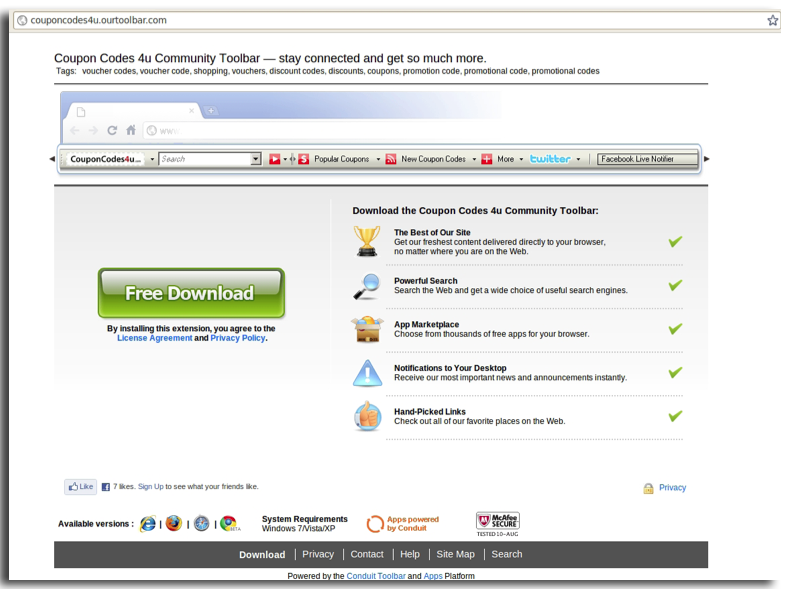Unlike the methods discussed above which nearly every affiliate program bans, incentivized marketing is allowed under some Terms of Service. Incentive marketing has evolved substantially and can take a wide-rage of forms. Even if incentive marketing is generally allowed in your program, there may be some forms of incentive marketing that are disallowed.
Incentive marketing is broadly used to cover a range of marketing activities. Those activities can include:
Toolbars and couponware are often used in incentivization schemes. Usually presented to customers as a way to save money, these types of programs promise the client discounts, cash back, and sometimes even donations to charity on nearly any online shopping site. Once the client downloads the software, a toolbar appears in their browser that activates any time that client accesses a site for which the program has an affiliate link. This toolbar will either automatically set a cookie that tells the merchant that the affiliate drove the sale—even through the customer arrived organically—or will flash a message to the customer that a discount is available if they leave the site and return through the affiliate link. Others will show coupons over the merchant’s site that set a cookie, again suggesting that the sale arrived via an affiliate rather than via a search. In short, these kinds of advertising toolbars and coupon reminder software may redirect a merchant’s own traffic through an affiliate link, making a merchant pay a commission on a freely achieved sale.

Incentive marketing can both deliver and destroy value in affiliate programs. Advertisers need to carefully consider the incremental value added by incentive marketing affiliates. A loyalty site may bring new customers to a merchant or it may just divert a merchant’s existing customers through its affiliate links.
Users that request an auto insurance quote in order to increase their status in a social game might be more or less likely to ultimately convert than typical users requesting a quote. Some sophisticated affiliate advertisers understand these metrics well and have built different commission levels depending on the source of the traffic.
The toolbars and couponware associated with incentive programs may bring issues of their own. The toolbars have been found in the past to overwrite existing affiliate cookies, auto-insert their own cookies and engage in behavior not clearly identified by the affiliate.
First and foremost, familiarize yourself with the techniques and consider their impact on your program. If you choose to work with incentive marketers, ensure that you understand exactly how they market your service and what tools they use to do so. Of course, if you’ve prohibited a technique there is no guarantee that some affiliates won’t be applying the technique.
Build a strong relationship with your customer service team. They will likely hear about any problems first. They might receive complaints about ‘not receiving their iPod’, or they may hear mentions of social games, or perhaps overly aggressive third-party email that they hadn’t opted into (spam).
If the affiliate offers a toolbar or other download, familiarize yourself with the software (ideally in a virtualized environment), or reach out to other affiliate managers on forums such as ABestWeb and the Affiliate Summit forum and understand their experiences. A few web searches can also yield a great deal of information about the software and whether it may create problems.
Most importantly tie your key metrics back to individual affiliates. These metrics need to go deeper than just commissions paid and should track the ultimate value contributed by each affiliate. This should help identify problem affiliates before they’ve had a tremendous negative impact on your service.
In 2009, the Federal Trade Commission updated their endorsement guide in order to better reflect the ever-changing field of internet marketing. The updates were aimed largely at the use of social media and blogs as platforms for paid endorsements and specify that bloggers who endorse products must disclose any financial benefits they receive. Should they fail to do so, and should the violation come to the FTC’s attention, the advertiser, not the endorser, bears the brunt of responsibility. This update to the regulations has clear ramifications for merchants running affiliate programs.
The merchant is considered liable for any false or unsubstantiated claims made through endorsements—defined as advertisements that consumers are likely to think express the opinions, beliefs, findings, or experiences of a person or party other than the sponsoring advertiser—or for a failure to disclose material connections between themselves and their endorsers. Advertisers are thus responsible for establishing a program to train and monitor affiliates that explains to the members of your network what can and cannot be said about a product, regularly monitors what people are saying about your product, and effectively follows-up on questionable practices. The FTC states that if a merchant has such a program in place, it is unlikely that a single rogue blogger would result in law enforcement action against the merchant. The updated Guides Concerning the Use of Endorsements and Testimonials in Advertising and the FTC’s FAQ section concerning them contain much useful information about the disclosure requirements as well as offer examples of compliance and non-compliance.
The Legacy Learning case was one of the biggest FTC complaints regarding affiliate marketing since the updated guides were released in 2009. The complaint states that Legacy Learning sold the Learn and Master Guitar program, a way to learn guitar at home though DVDs and written materials, via an affiliate program for which the company recruited “Review Ad” affiliates. These affiliates endorsed the program through articles, blogs, and editorial material that included affiliate links to purchase the system. These affiliates made large commissions and generated approximately $5 million in sales of Learn and Master. Because Legacy Learning did not disclose that their affiliates were paid for every generated sale, instead, allowing their affiliates to imply that these online endorsements reflected the opinions of average consumers and “independent reviewers,” the FTC charged the company with dissemination of deceptive advertisements.
The FTC and Legacy Learning settled in June, 2011. Under the settlement, Legacy Learning will pay $250,000 to the FTC and agree to monitor their top 50 affiliate marketers as well as another random sampling of 50 each month. This monitoring will ensure that their marketers are both disclosing their relationship to the company and are not representing themselves as independent reviewers or average consumers. Legacy Learning must submit these monthly reports to the FTC. They further must remove any affiliate in violation of these terms immediately.
